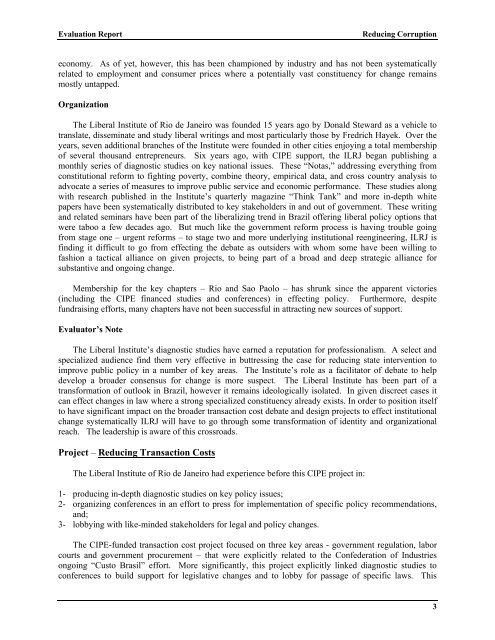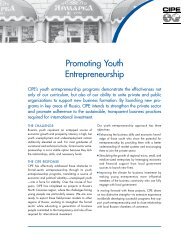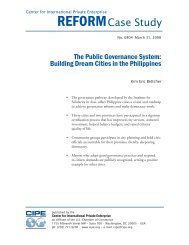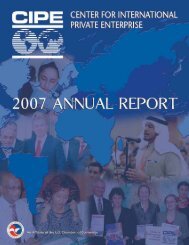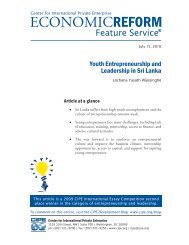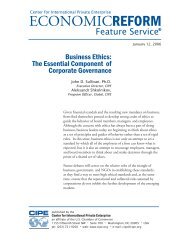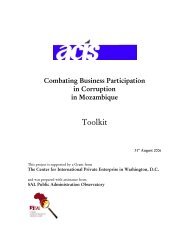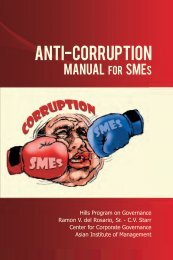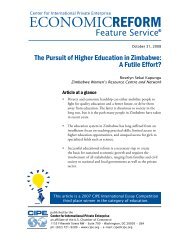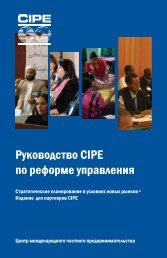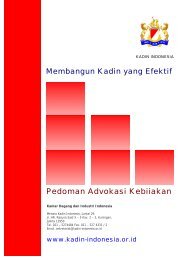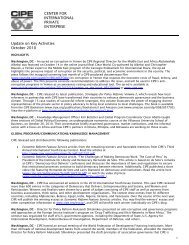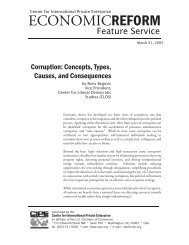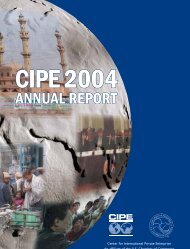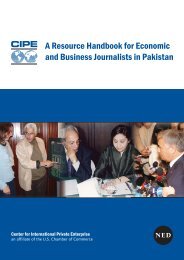REDUCING CORRUPTION A Report on Two Anti-Corruption Projects
REDUCING CORRUPTION A Report on Two Anti-Corruption Projects
REDUCING CORRUPTION A Report on Two Anti-Corruption Projects
You also want an ePaper? Increase the reach of your titles
YUMPU automatically turns print PDFs into web optimized ePapers that Google loves.
Evaluati<strong>on</strong> <str<strong>on</strong>g>Report</str<strong>on</strong>g>Reducing Corrupti<strong>on</strong>ec<strong>on</strong>omy. As of yet, however, this has been champi<strong>on</strong>ed by industry and has not been systematicallyrelated to employment and c<strong>on</strong>sumer prices where a potentially vast c<strong>on</strong>stituency for change remainsmostly untapped.Organizati<strong>on</strong>The Liberal Institute of Rio de Janeiro was founded 15 years ago by D<strong>on</strong>ald Steward as a vehicle totranslate, disseminate and study liberal writings and most particularly those by Fredrich Hayek. Over theyears, seven additi<strong>on</strong>al branches of the Institute were founded in other cities enjoying a total membershipof several thousand entrepreneurs. Six years ago, with CIPE support, the ILRJ began publishing am<strong>on</strong>thly series of diagnostic studies <strong>on</strong> key nati<strong>on</strong>al issues. These “Notas,” addressing everything fromc<strong>on</strong>stituti<strong>on</strong>al reform to fighting poverty, combine theory, empirical data, and cross country analysis toadvocate a series of measures to improve public service and ec<strong>on</strong>omic performance. These studies al<strong>on</strong>gwith research published in the Institute’s quarterly magazine “Think Tank” and more in-depth whitepapers have been systematically distributed to key stakeholders in and out of government. These writingand related seminars have been part of the liberalizing trend in Brazil offering liberal policy opti<strong>on</strong>s thatwere taboo a few decades ago. But much like the government reform process is having trouble goingfrom stage <strong>on</strong>e – urgent reforms – to stage two and more underlying instituti<strong>on</strong>al reengineering, ILRJ isfinding it difficult to go from effecting the debate as outsiders with whom some have been willing tofashi<strong>on</strong> a tactical alliance <strong>on</strong> given projects, to being part of a broad and deep strategic alliance forsubstantive and <strong>on</strong>going change.Membership for the key chapters – Rio and Sao Paolo – has shrunk since the apparent victories(including the CIPE financed studies and c<strong>on</strong>ferences) in effecting policy. Furthermore, despitefundraising efforts, many chapters have not been successful in attracting new sources of support.Evaluator’s NoteThe Liberal Institute’s diagnostic studies have earned a reputati<strong>on</strong> for professi<strong>on</strong>alism. A select andspecialized audience find them very effective in buttressing the case for reducing state interventi<strong>on</strong> toimprove public policy in a number of key areas. The Institute’s role as a facilitator of debate to helpdevelop a broader c<strong>on</strong>sensus for change is more suspect. The Liberal Institute has been part of atransformati<strong>on</strong> of outlook in Brazil, however it remains ideologically isolated. In given discreet cases itcan effect changes in law where a str<strong>on</strong>g specialized c<strong>on</strong>stituency already exists. In order to positi<strong>on</strong> itselfto have significant impact <strong>on</strong> the broader transacti<strong>on</strong> cost debate and design projects to effect instituti<strong>on</strong>alchange systematically ILRJ will have to go through some transformati<strong>on</strong> of identity and organizati<strong>on</strong>alreach. The leadership is aware of this crossroads.Project – Reducing Transacti<strong>on</strong> CostsThe Liberal Institute of Rio de Janeiro had experience before this CIPE project in:1- producing in-depth diagnostic studies <strong>on</strong> key policy issues;2- organizing c<strong>on</strong>ferences in an effort to press for implementati<strong>on</strong> of specific policy recommendati<strong>on</strong>s,and;3- lobbying with like-minded stakeholders for legal and policy changes.The CIPE-funded transacti<strong>on</strong> cost project focused <strong>on</strong> three key areas - government regulati<strong>on</strong>, laborcourts and government procurement – that were explicitly related to the C<strong>on</strong>federati<strong>on</strong> of Industries<strong>on</strong>going “Custo Brasil” effort. More significantly, this project explicitly linked diagnostic studies toc<strong>on</strong>ferences to build support for legislative changes and to lobby for passage of specific laws. This3


